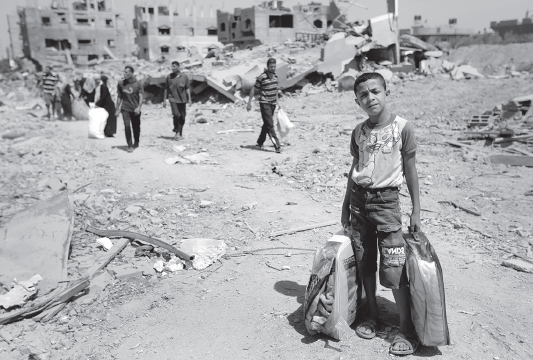Israeli military divided over Gaza war probes
Palestinians threaten action against operation in international court
A fierce debate is raging within Israel's military over the extent to which soldiers should be held legally accountable for their actions during last year's Gaza conflict, with commanders increasingly at odds with military lawyers.
The dispute has set off a firestorm in Israel, where many say the legal threat would shackle soldiers in any future battle, lower their morale and shatter a sacred trust on which Israel's compulsory military service relies.
But with the Palestinians announcing their application last week to the International Criminal Court, the decision to investigate becomes all the more pressing: A robust Israeli inquiry into its military's actions could be essential in thwarting an embarrassing and potentially incriminating outside probe.
Gaza operation
Israel launched the operation in Gaza on July 8 in what it said was a mission to halt relentless rocket fire by Hamas militants. During 50 days of fighting, more than 2,100 Palestinians were killed, most of them civilians, according to the Hamas-run Health Ministry and the United Nations. On the Israeli side, 66 soldiers and 6 civilians were killed.
Israel has defended the operation as an act of self-defense and blamed Hamas for the heavy civilian death toll, saying the militant group used residential areas for cover. But critics have pointed to the heavy Palestinian civilian death toll and questioned whether Israel's response was proportionate.
Israel has also come under fire from critics who say it fails to thoroughly investigate its military operations or prosecute soldiers for abuses.
Israel says it does investigate its actions, although those inquiries rarely lead to criminal punishment. Following a similar operation in Gaza in early 2009, the army convicted a total of four soldiers on various charges, including looting, improper use of a weapon and life-endangering conduct. The most serious sentence was a three-and-a-half month prison term.
Israel's outgoing military chief, Lieutenant General Benny Gantz, has walked a fine line in the debate, trying both to soothe the troops' worries and explain the need for inquiries.
"Soldiers and commanders know they have the full support of the command level," Gantz said last month. "I feel very secure with our support and with the investigations, which are a necessary tool for our continued improvement."
100 complaints
Israel's military advocate general, Danny Efroni, is seen as the leader of the drive to investigate soldiers. Efroni and his legal team have received more than 100 complaints regarding incidents from last summer's war and plan to conduct criminal investigations into at least 10, including the deaths of four boys in an explosion on a Gaza beach on July 16 and an attack on a UN school on July 24.
Efroni's perspective, military analysts say, views an internal investigation as preferable to a potential probe by the International Criminal Court. The military did not answer a request seeking comment.
Palestine is expected to join the court within about 60 days. Once that happens, they can submit war crimes claims against Israel. However, if Israel can show the court that it has carried out its own investigation in good faith, it could avoid an outside probe.
"Some in the military say 'let us investigate, we have nothing to hide. The moment we investigate, international law won't intrude. There will be no international inquiry and no trial in The Hague,'" said Ilan Katz, a former military deputy advocate general.
|
Palestinians carry belongings that they salvaged from their destroyed homes in the heavily bombed town of Beit Hanoun, Gaza Strip, close to the Israeli border on Aug 1. Lefteris Pitarakis / Associated Press |



















